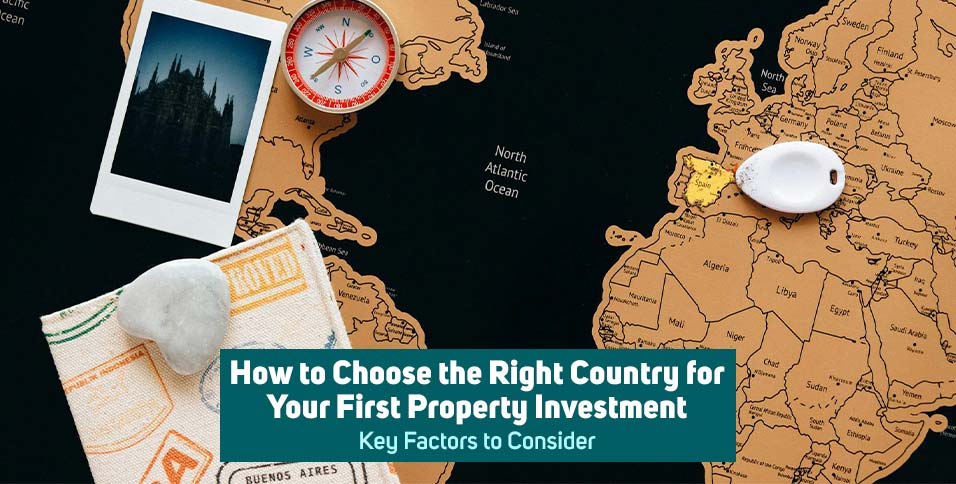When diving into the world of property investment, selecting the right country can set the foundation for your success. You should consider various factors including market stability, potential returns, and legal considerations. Locations offering favorable investment programs and rental yields can be especially attractive for first-time investors.
Understanding the dynamics of local markets can help you achieve greater profitability and security. You’ll want to look into the country’s economic indicators, such as growth rates and inflation, as well as ease of doing business and transparency in legal procedures. Factors like cultural affinity, lifestyle benefits, the ability to sail on amazing adventures in your vacations, and language can also impact your decision-making process.
Considering the global real estate landscape, some countries offer unique opportunities that align with different investment goals. Whether you’re drawn to vibrant local economies or visa opportunities linked to property acquisitions, you can find destinations that suit your requirements. This decision will be pivotal in shaping your journey as an international property investor.
Evaluating Potential Countries
When choosing a country for your first property investment, consider factors like economic stability, real estate market trends, legal frameworks, and quality of life. These elements are crucial in assessing the long-term viability and profitability of your investment.
Economic Stability and Growth Prospects
You should assess a country’s economic health by looking at its GDP growth, inflation rates, and employment data. A stable economy often translates to a more reliable real estate market. For instance, solid economic indicators typically suggest that property values will appreciate over time. Political stability is another factor to consider, as frequent changes in government policies can impact your investment. Conducting thorough research will help ensure that your investment is backed by a robust economy.
Legal and Tax Considerations
Familiarizing yourself with a country’s legal and tax frameworks is essential. Different countries have varied property ownership laws that can affect your rights as an investor. Taxation on real estate can include property taxes, capital gains taxes, and income taxes on rental income. Misunderstanding these aspects might lead to unforeseen liabilities. Thoroughly reviewing regulations and possibly consulting with legal experts will help you navigate these complexities effectively.
Living Standards and Quality of Life
The quality of life and living standards are significant when choosing a location for property investment. Factors such as healthcare, education, and safety can impact property values and tenant demand. Places with high living standards often attract more expatriates and retirees, boosting real estate demand. For example, moving to a destination like Panama offers a favorable living environment and financial benefits. Knowing the living conditions helps you cater to potential residents’ needs, enhancing the attractiveness of your investment.
Making The Investment
When investing in property, focus on strategic location selection, understand your budget, and ensure a smooth buying process. Addressing these factors directly impacts the success of your investment venture.
Choosing the Right Location
Selecting the ideal location is crucial. Consider factors such as economic growth, infrastructure, and legal environment. Look at regions with stable property values and potential for appreciation. Research areas with strong rental demand if you plan to generate income.
Panamá is an attractive option for many due to its favorable tax policies and robust real estate market. Accessibility, nearby amenities, and potential for tourism can influence returns. Consulting with local experts familiar with regional nuances can provide insights into the most promising locations.
Property Type Selection
Deciding on the right property type depends on your investment goals. If seeking rental income, consider apartments in urban centers with high demand. For long-term appreciation, single-family homes in emerging neighborhoods might be ideal.
Analyze local market trends and preferences to determine what property types are in demand. Mixed-use properties, combining commercial and residential spaces, can offer diversified income sources. Evaluate maintenance requirements and potential upgrades needed to maximize value. Each property type requires different management strategies and financial commitments.
Financial Planning and Budgeting
Financial planning ensures you invest within your means. Start by defining your budget and understanding the total costs involved, including purchase price, closing costs, taxes, and maintenance expenses. Investigate potential financing options, such as mortgages or property loans.
In some regions, foreign investors might have higher borrowing costs or require larger down payments. Utilize tools like spreadsheets or financial planning apps to visualize cash flow and returns on investment. Consider currency exchange rates and their potential impact on your budget. Developing a detailed financial plan reduces risk and prepares you for unforeseen expenses.
Navigating the Purchase Process
The purchase process can vary significantly by country, so familiarize yourself with local regulations and procedures. Engage a reliable local real estate lawyer to guide you through legal papers and ensure compliance with local laws. This step is crucial in countries with complex property laws.
Hire a local agent experienced in dealing with foreign buyers to streamline your search and negotiate on your behalf. They can identify property issues and advise on fair pricing. Be prepared for cultural differences in negotiation styles and document requirements. Completing a thorough due diligence process, including property inspections and title checks, minimizes risk and secures a sound investment.
Also Read: Bradford’s Property Market: Meeting the Demands of the UK’s Youngest City

















